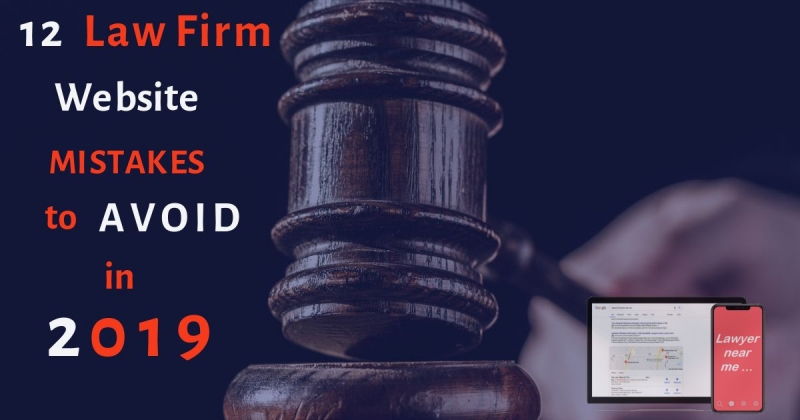One advantage of working exclusively with lawyers over the past 20 years is that in the process of maximizing their websites for lead generation, we first evaluate any existing sites in order to identify what was and wasn’t working.
With that in mind, we’ve compiled a list detailing some common mistakes that law firm websites make in light of what Google and Bing search engines will be most on the lookout for in 2019 in order to distinguish the best attorney websites from the rest.
-
Neglecting Image SEO
People are visual creatures. That’s why a 2015 survey conducted by SEO industry experts revealed that 67% of web users preferred content that incorporated at least one image.
It’s no surprise, then, that Google has made improvements to Google Images and is also developing visual search technologies. Bing has also been making major improvements to its image search engine and both companies are expanding the use of images within their search results.
The takeaway: Traffic from images has increased for all sites. Websites that overlook image SEO will do so at their own peril.
Your site can reap the rewards of image SEO using crisp, relevant images and the help of content specialists or SEO copywriters.
PRO TIP: Overlaid text needs to be fully legible, even for programs, as machine learning and Google bots get better at deciphering text in images.
-
Keyword Stuffing
Keyword stuffing has long been delegated to the SEO trash bin. However, it still rears its ugly head now and again. For instance, DUI defense lawyers should be on the lookout for content that overuses the practice area acronyms.
PRO TIP: Instead of referencing DUI/OUI/DWI in every sentence that uses the shorthand; simply explain upfront to readers that OUI (or OVI, DUI, DWI) is used interchangeably with the other abbreviations.
-
Lack of Branding / Missing Logos
Strong branding can yield exponential results for all your marketing, both online and off.
That’s why most SEO pros believe Google is now paying close attention to branding and the sites and web pages that do branding well. To start gaining traction from your brand online:
- Determine your Unique Selling Proposition, or USP. Then distill it down to one sentence —AKA your “tagline.”
- Develop a logo. Your SEO agency should be helpful with this. If not, hire a graphic artist to create your law firm’s logo.
- Ensure the logo and tagline appears prominently on your law firm’s homepage, services pages and on the main navigation of your website.
- Make sure you have your logo made in all web-standard sizes, including favicon. The favicon is the tiny scale of your logo that shows up on the browser tab for your pages.
Page tabs without favicons look suspicious to today’s internet users. You don’t want to start off from a position of distrust; especially when the fix is relatively easy.
-
Not switching to Secured Protocol and HTTPS
Google’s Chrome browser now shows a warning icon on all URLs that do not use the Secure Socket Layer (SSL) protocol to allow for proper encryption across the web.
And if that isn’t a strong enough signal that it’s time to put a lock on your law firm website, then consider consumer trust, the ABA requirements, more frequent data hacks, and a whole host of other security issues.
A note about switching to SSL: Moving to HTTPS carries a risk of generating duplicate content —but only if your site manager does not setup 301 redirects from the HTTP version of your pages to the HTTPS version.
Duplicate content of this nature penalizes your web pages because search engines struggle to figure out which version of a page is more relevant to the search query.
-
Ignoring Web Formatting
The format and structure of each page on your website is very important to the page’s overall success both in terms of search engine rankings and your visitors’ experience.
Work with developers and website designers who understand HTML5 formatting for all major browsers in addition to how formats affect responsive design on various devices.
This gets in the technical weeds a bit, but attorneys who want to pull in the most traffic of quality leads need to pay attention to web formats. Even better; work with a law firm SEO expert who does.
-
Not Using Local SEO
Unless you’ve been working with a law firm marketing company, you might mistakenly believe that local SEO and SEO are generally one and the same. Not so.
Local SEO deploys an entire subset of specific on-page and off-page elements which are required so your firm shows up for location-specific queries on Google. Lawyers benefit immensely from local search queries for which their content is surfaced.
Someone involved in a serious car accident or just pulled over by police could have the wherewithal to whip out their phone and ask Google “where is a good defense lawyer near me?”
To get listed for these kinds of local searches inside the map packs, you need the help of specialized local SEO experts who also know legal SEO.
-
Not Utilizing Video
A web tech study conducted by Cisco indicates that video will account for 80% of all internet traffic by the end of 2019!
To unlock the power of video, work with content specialists who understand your business and the practice areas you serve. They should be able to guide you from beginning to end and can offer:
- Video scripting
- Video SEO
- Video editing
- Final production &
- Upload formats for all relevant platforms.
Start 2019 off strong by making a few short videos for your law firm’s website. Need ideas and guidance? Reach out to see how we can help: 877-870-0416.
-
Using Resumes for Attorney Profiles & About Pages
If your About Attorney page reads more like a curriculum vitae and less like a handyman’s guide to how you’re capable of solving specific legal problems, it’s time to make a change.
A good attorney profile is robust and connects with the reader instantly through a great head shot photo that has also been marked up with attorney schema. Next, the prospect should be able to quickly find the information about you that they’re looking for.
PRO TIP: Bullet lists are an excellent conduit for textual clarity.
Finally, keep in mind that prospects might find the first instance of your bio on external sites like Justia or AVVO. If you’re unsure of whether or not to claim your profile on these websites, consult with a law firm SEO expert to find out.
-
Ignoring Voice Search Optimization
Google Duplex, Google Home and Google Assistant are all products centered on voice search. Also noteworthy; they’re major product investments by the search giant company. Anyone who thought voice search was a fad needs to think again.
Voice Search is gaining steam fast, with more and more consumers speaking into their phones, smart speakers and browsers to find what they need not just on the World Wide Web generally, but on the local web as well.
A new field of search marketing has blossomed called Voice Engine Optimization, or VEO, and your law firm website should be taking advantage of VEO now.
Questions as Content are central to VEO. Think of specific questions you can expertly answer on your blog using the question itself as the content title. Adding related questions and answers within articles along with FAQ pages will also help to capitalize on rising Voice Search traffic.
-
Not Being Mobile Friendly
This year, more people accessed the internet using a mobile phone than from a personal computer. Search engines now prioritize traffic from mobile searchers using a mobile-first index.
What does mobile-first search mean to Google and your firm’s website? Google’s mobile first index tells us that from now on, website owners and internet advertisers have to pay special attention to how their content looks on mobile devices.
Simply put: You cannot successfully promote and market your website without a responsive design that’s filled with mobile-friendly pages.
-
Forgetting About Client Reviews
Not only should your law firm’s website have an entire page devoted to client reviews and testimonials; it needs to place reviews front-and-center on:
- Your homepage
- Your most important service pages
- Pages targeting your primary keywords
- Your social media accounts
If this seems overkill to you, consider that a recent Google algorithm update appears to have assigned even more weight to customer and client reviews than before. Moving forward, the power of online reviews will be increasingly impactful for lawyer SEO and your website.
-
Outdated Information
Laws are constantly changing and if your attorney website has outdated information about a law that has been modified, amended or repealed, Google will penalize those pages by ignoring them in its search results.
Search engines also loathe outdated links that click through to a ‘page not found’ message. These are broken links that need to be removed from your site or fixed as soon as possible.
The best attorney websites in 2019 and beyond will be those that address the issues listed above completely, while simultaneously exploiting emerging areas for lawyer SEO.
Pursuing both tracks will position your site as the legal authority in your service areas; which also means you’ll leave your competitors in the dust.







